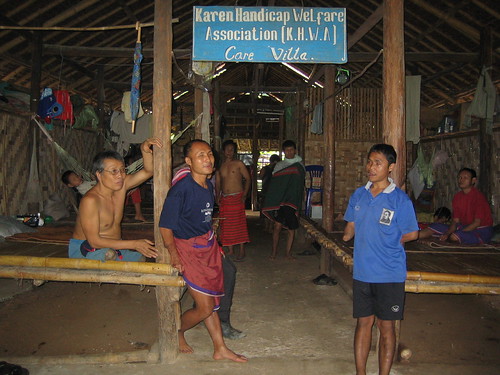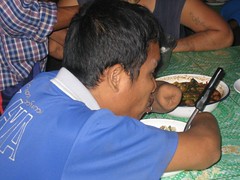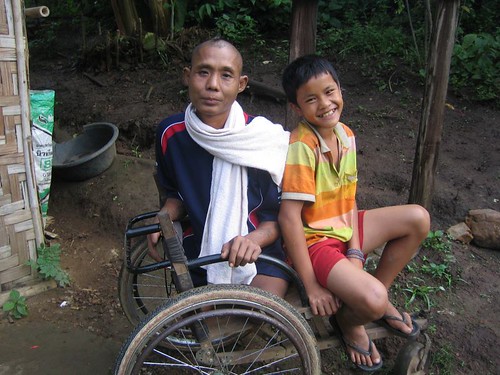
The Care Villa, it sounds like a nice place, convenient and relaxing. I have to admit, it is a very special place. The people who live there; the people who dedicate themselves to care for them; the atmosphere� it�s one of those places that you will never forget once you�ve been there. I had been there one time before, a few weeks ago, together with Imbert, Wolfgang, Lori and James to record songs.
It had been a very impressive day and their need for help stayed in my mind ever since. Last week I finally got the opportunity to go back into Mae La refugee camp, back to the Care Villa. My mission was to evaluate the needs and possibilities of all the 16 men living there together. This time, things were different: actually, things were normal.
A normal day, one of many others. For the residents of Care Villa a normal day consists of waking up early, of struggling to get dressed, of being fed, of needing help at the toilet, of finding the way on the touch, of asking a friend to scratch your mosquito bites, of accidentaly bumping into the wooden pillars, of frustration when the mug slips away between the stumps, of sitting, of waiting for the day to pass by. I was there, amongst them, with them, for them. I wanted to get to know the daily routine. I wanted to get to know them. I observed, I saw and I listened. But I didn�t dare to imagine, to be honest.
 That�s what I normally do: imagine what it must be like to live with the limitations other people have to face. But the idea of losing both my eyes and my hands makes me simply freak out. I just wouldn�t know what to do. Try it yourself, maybe just for 10 minutes. And no cheating with all sorts of luxurous facilities or tools! No guiding dogs, no 24 hours personal care, no speaking computers, no automatic lights, no sound devices, no high-tech prosthesis controlled by brain activity. Add the imagination of living in a refugee camp, forced to leave your home country, maybe still suffering from nightmares about that life-changing moment when you touched that landmine, not being able to take care of your family in a culture where this might be the most important thing in life.
That�s what I normally do: imagine what it must be like to live with the limitations other people have to face. But the idea of losing both my eyes and my hands makes me simply freak out. I just wouldn�t know what to do. Try it yourself, maybe just for 10 minutes. And no cheating with all sorts of luxurous facilities or tools! No guiding dogs, no 24 hours personal care, no speaking computers, no automatic lights, no sound devices, no high-tech prosthesis controlled by brain activity. Add the imagination of living in a refugee camp, forced to leave your home country, maybe still suffering from nightmares about that life-changing moment when you touched that landmine, not being able to take care of your family in a culture where this might be the most important thing in life.I got to know them. At least a little bit: the part that they wanted to share with me. Their history, their thoughts, their frustrations, their dreams, their stories. �A group of landmine survivors� became individual persons. Handicaps became challenges. Every dead end street has a side street leading somewhere. We only have to walk down the road first before we can see what�s around the corner.
Clear Path doesn�t turn its back on (what seems to be) a dead end street. We cannot fix eyes, hands or legs. We cannot turn back time or solve the issues in Burma. But we can look for possibilities, a side street, a change of direction; just small things that can make a big difference.

No comments:
Post a Comment